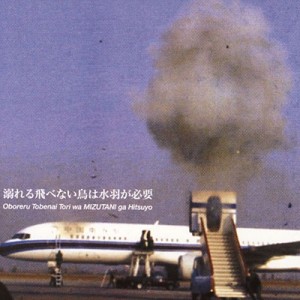
“Yodo-go-a-go-go”: The infamous JAL hijack gave its name to one of the Japanese Underground’s most legendary albums.
On this day in 1970 occurred the all-time single-most revolutionary political act in rock’n’roll, when Moriaki Wakabayashi – bass player of Tokyo’s notorious underground legends Les Rallizes Denudés – accompanied several other members of the Japanese Red Army Faction in the armed hijack of Japan Airlines Fight 351. Here is a full account of this extraordinary event from Julian Cope’s 2007 Japrocksampler:
“In the early morning of March 31st, nine members of the Japanese Red Army Faction, all aged between nineteen and twenty-one years old, boarded a Japan Airways Boeing 727 at Tokyo’s Haneda Airport, on an internal flight bound for Fukuoka. At 7.33 a.m., soon after the aircraft had reached its cruising height, the nine terrorists stormed the cockpit armed with pipe bombs and samurai swords, screaming the fearful words: ‘We are Ashitano Jeo!’ From this first moment of the hijacking, many of the 129 passengers aboard, still bleary-eyed and expecting a forty-five minute flight, had become hysterical with fear because their assailants were screaming longhairs who were aligning themselves with a famous Manga outsider TV hero who’d striven to win a boxing championship in a cartoon series of the same name. Like the Manson Family’s daubing of phrases such as ‘Political Piggy’ and ‘Helter Skelter’ around their crime scenes, the Yodo-go hijackers decision to invoke the ‘divine’ power of cartoon hero Ashitano Jeo was way too far outside all frames of reference for the stricken passengers.
Demanding that the pilot take them all to Cuba, the hijackers were furious to discover that the Yodo-go had only enough fuel for its original destination, and they reluctantly agreed to land at Fukuoka’s Itatsuki Airport. For three long days, the Yodo-go sat on the tarmac as negotiations took place. Eventually, a compromise was reached. The authorities agreed that the airliner should be allowed to fly instead to Pyongyang, in Communist North Korea, if twenty-three women and children were allowed to leave the airline in return for a total refuelling and the substitution of the Japanese transport minister Shinjuru Yamamura as hostage. The aeroplane set off westwards, but the Yodo-go’s pilot Shinki Iashida hoodwinked the hijackers into landing at South Korea’s Gimpo Airport, at 3pm. Believing that the runway was a part of North Korea’s Pyongyang Airport, the hijackers sought to confirm this by asking a member of the ground crew for a photo of dictator Kim Il Sung as proof of their northerly position. Denied this proof, the nervous hijackers then panicked and refused all food and drink. However, they eventually accepted that all the passengers – including many US nationals – should be allowed to leave the aircraft, in return for permission to fly to North Korea. The plane left Gimpo airport and headed north, landing in the disused Minimu Airport, where the North Korean authorities hailed the nine as cultural heroes, granted them political asylum, and insisted that they remain in North Korea, where they received military medals and were given ‘luxury accommodation’ at the Village of the Revolution.
In Japan, the ramifications were massive, for the hijacking was both humiliating for the Japanese authorities, and disturbing to the wider world, who were then still reeling from the bombing of Milan’s Piazza Fontana by right wing extremists the previous December. Furthermore, the presence of so many US nationals aboard the Yodo-go had brought the CIA to Japan and the names of the nine hijackers only emerged via the media in dribs and drabs. Slowly, the Japanese underground realised that this hijack had indeed been the work of their own people, many having been students from Osaka University or Kyoto’s forward-thinking Doshishi University. But for Japan’s burgeoning underground rock’n’roll scene, the strangest presence of all among the hijackers was that of Moriaki Wakabayashi, bass player with ‘The Radical Music Black Gypsy Band’ Les Rallizes Denudés.”
[Written by Julian Cope, Japrocksampler pps. 123-124]


3 Responses to 31st March 1970 – The Yodo-Go Hijack